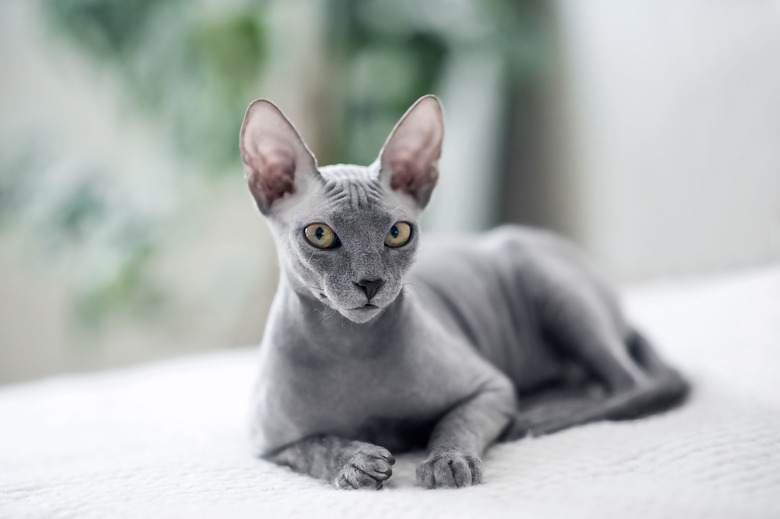Sphynx Cat Breed Facts & Information
The cat breed sphynx is easily recognizable for their hairless appearance. They are a popular option for people who are allergic to cats. While the sphynx isn't actually hypoallergenic and still produces the protein that causes allergies, their lack of hair and shedding means that the allergens are less likely to be floating around the room. Some sphynx cats serve as therapy animals, a role for which they are well suited thanks to their affectionate and outgoing personality.
Sphynx cat appearance
Sphynx cat appearance
Many believe that there is no such thing as a haired sphynx cat, but actually, all cats of the breed have hair. It is not the normal fur that other breeds have but rather a fine, downy hair that may not be visible, but you will feel it when you pet the cat. The skin is loose and wrinkled. There are many sphynx cat colors and patterns.
The sphynx is a medium-size cat, with females weighing 7 to 10 pounds and males weighing 8 to 14 pounds. The cats are muscular with a full belly. They have wide, open eyes and large, hairless ears.
History of the cat breed sphynx
History of the cat breed sphynx
What is a sphynx? The sphynx breed can be traced back to Ontario, Canada in 1966 when a hairless kitten was born as a result of inheriting a recessive trait from both parents. This cat was used to breed more hairless cats and develop the breed. The cats were originally called Canadian hairless cats but were often referred to as sphynx due to their resemblance to the Egyptian sphynx sculpture.
Sphynx cat personality and temperament
Sphynx cat personality and temperament
While breed is not a reliable indicator of temperament, the personality of sphynx cats can be described as affectionate and outgoing. They are loyal to their owners and make excellent companions. They are also friendly and outgoing with visitors as well and may serve as a welcoming committee for your guests. The cats are alert and intelligent.
Sphynx cats are very active, which can be quite entertaining for cat owners, but don't be surprised if they get into trouble knocking things off shelves and opening cabinet drawers.
Sphynx care and health
Sphynx care and health
The life expectancy for a sphynx cat is 15 years or more. They are generally healthy, but the genetic condition hypertrophic cardiomyopathy is a concern in this breed. Responsible breeders should test their breeding cats and the resulting kittens for this condition. However, it may not show up in young cats, so sphynx cat owners should have their veterinarian pay close attention to the heart health of their cat.
Sphynx cats don't need to be brushed, but they do need the occasional bath when their skin gets oily. Be sure to use a gentle shampoo. Since they don't have hair, extra care is needed to protect these cats. Wipe their eyes each week and clean the ears weekly to clear out the buildup of wax. Check their nails weekly and trim them as needed.
If allowed outdoors, they are at risk of sunburn. They are also more likely to get cold since they don't have fur to insulate and warm them. Shirts or sweaters for your cat can help offer that protection. Sphynx cats tend to have strong appetites and a naturally round belly, so it is important to monitor their weight to keep them at a healthy weight.
